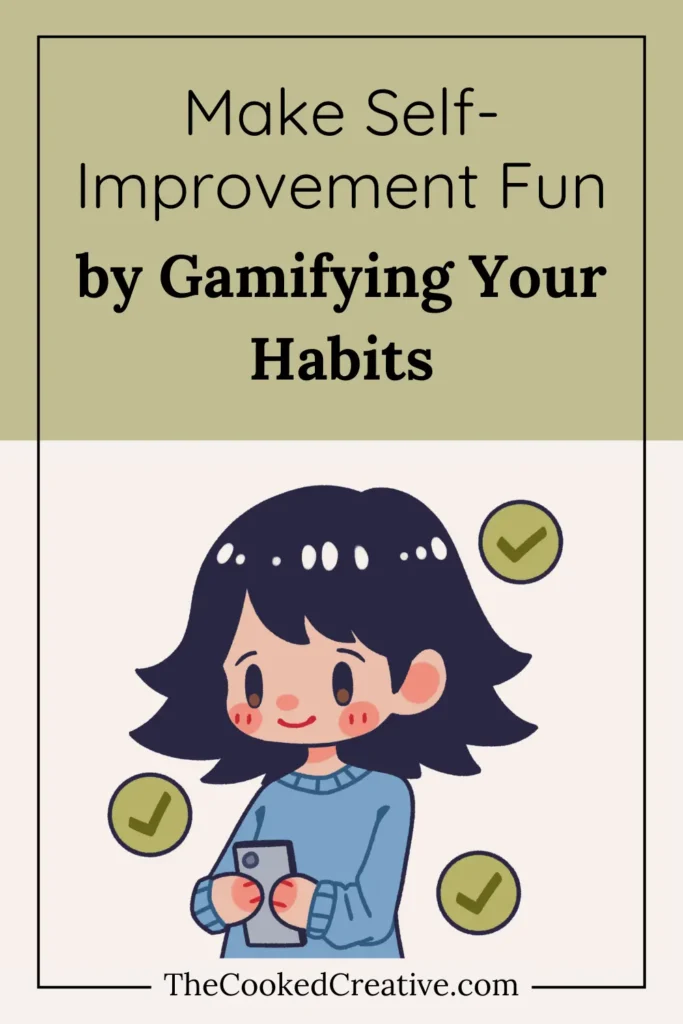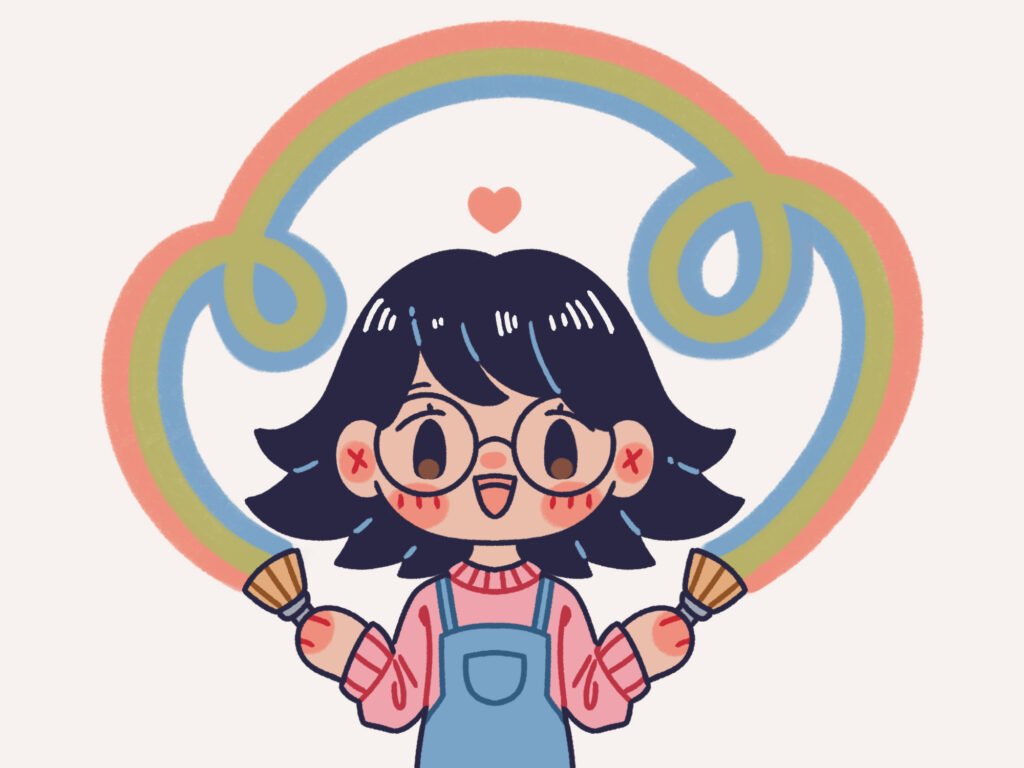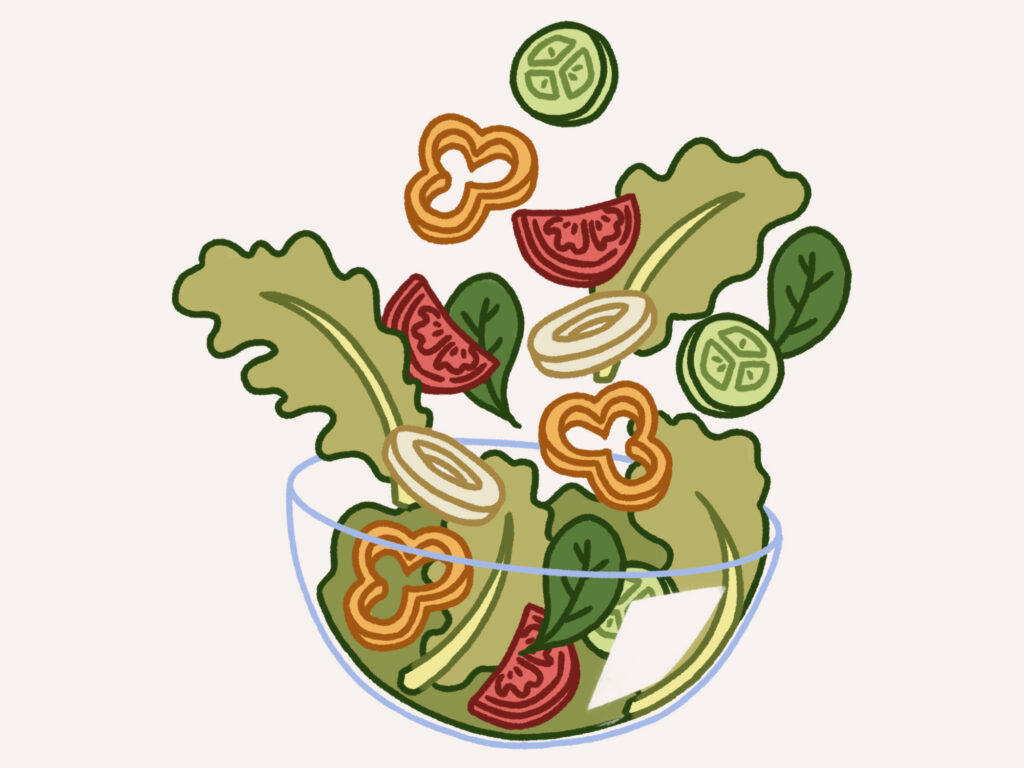
Make Self-Improvement Fun by Gamifying Your Habits ft. Léan & Maren
Building new habits can feel daunting, especially when motivation comes and goes or the process feels slow. I recently came across a tweet that inspired me to dive deeper into the idea of habit gamification!
By incorporating elements like points, rewards, and levels, habit gamification makes even the most boring everyday tasks feel like mini-challenges, bringing excitement to habit-building. This method offers a fresh way to stay on track despite your goals, whether you’d like to build a healthy habit or get rid of negative ones. This approach doesn’t just help with consistency; it provides instant feedback and rewards, making self-improvement feel more like leveling up in a game.
In this post, we’ll explore what makes habit gamification so effective, how it can support neurodivergent people, and how you can apply it to reach your goals.
To bring even more insight into this topic I’ve invited 2 guests, Léan and Maren, who both have used gamification techniques in their own lives and have achieved their goals. Let’s dive deeper into their perspectives!

Thank you for having me! I’m Maren, a freelance illustrator from Spain who has been working for the last 12 years on private and commercial projects, as well as managing my online shop.
How did you get interested in art? When did it all start?

My journey with art started when I was five or six years old, and I owe it all to my mom who watched so many Pokemon episodes with me. She came up with the idea of drawing the front view of a Pokemon, cutting it out, and then drawing the back view as we imagined it. That’s one of my most precious memories, and I’m so grateful that she introduced me to drawing because it’s such a fundamental part of myself that I think that I would be a completely different person without it.
What inspired you to become an artist yourself?

I don’t think there was a specific moment when I decided I wanted to pursue art because it’s something that happened naturally. For me, drawing has always been like a quiet and comfortable space where I can explore whatever interests me or brings me joy at the moment, so there was no question about what I wanted to do, thankfully, my mom was always extremely supportive.
Even though it may sound shallow, I don’t think I have any big aspirations or motivations to be an artist. I honestly just want to live a simple life and have fun while drawing and improving my craft. The excitement of not knowing what I’ll be able to do next and that I’ll never really stop learning is what keeps inspiring me to be an artist.
Understanding Gamification
At its core, gamification is the process of turning everyday activities into game-like experiences by incorporating game elements and mechanics. In the context of habit-building, you can use strategies found in games such as rewards, challenges, levels, and progress tracking to make the process of forming and maintaining habits more engaging, rewarding, and ultimately, a lot more fun.
Gamification is about creating an environment and system where your goals feel like challenges to conquer, rather than tasks to check off. Adding elements that trigger the same excitement and satisfaction you get from playing a game, helps you stay engaged and eager to keep going.
The 4 components of a gamification system:
- Rewards and points: One of the most common elements is the use of rewards, they provide motivation and make the process more satisfying. For example, you might earn 10 points for each workout completed, and once you hit 100 points, you treat yourself to something special.
- Levels and milestones: Levels give you a sense of progression, just like a videogame. Milestones can act as check-ins along the way, helping you stay focused and celebrate small wins. For example, hitting a “30-day-streak” milestone for meditating daily could be celebrated with a reward.
- Progress tracking: Visualizing progress is another key element. It could be done by using progress bars, graphs, or streaks, they allow you to see how far you’ve come. Being able to visually track your progress, reinforces the habit and encourages consistency.
- Challenges and quests: Adding challenges or quests to your habit-building system can bring a sense of adventure to the process. These could be weekly or monthly challenges that push you to complete specific tasks or level up your habits. Challenges add an element of fun and excitement, especially when paired with friendly competition or personal rewards.
Benefits of Gamifying your Habits
- Extra motivation: This system taps into our natural desire for achievement and progress, providing immediate gratification through points, rewards, and levels. This sense of accomplishment motivates us to keep pursuing our goals, making the process more enjoyable.
- Procrastination buster: Incentives like points and rewards provide clear goals, making it easier to overcome procrastination. When you know you’ll earn points or reach a new level by completing a habit, it becomes easier to get started and avoid putting tasks off.
- Burnout prevention: Breaking down bigger goals into smaller, manageable steps, helps prevent the all-or-nothing approach that sometimes leads to burnout. The journey feels less intense and more sustainable when you take baby steps and get rewards. Also, gamification rewards taking breaks and celebrating wins along the way, which helps in maintaining long-term consistency.
- A sense of accomplishment: When you see the progress you’ve made, it reinforces positive feelings and makes you eager to continue. This sense of accomplishment can be particularly powerful for maintaining habits over time, as you can look back on what you’ve achieved and feel encouraged to keep going.
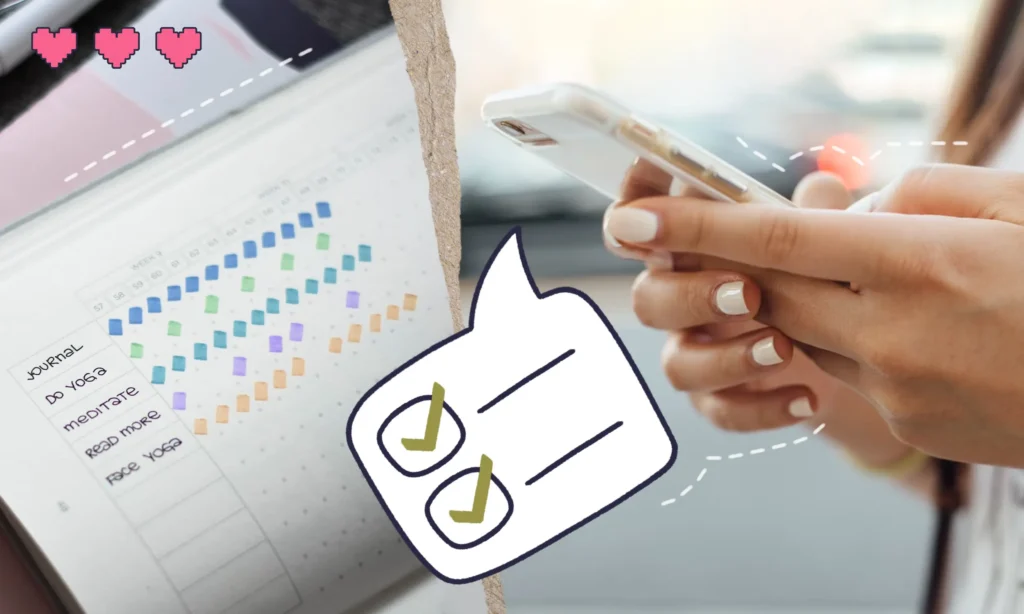
How has gamification impacted your personal habits? Are there specific habits you’ve successfully built through it?

Honestly, gamification has been one of the most significant improvements I’ve found this year! Simply marking a habit as done doesn’t motivate me enough to keep using a habit tracking system once the initial excitement is gone, but gamifying my habits helps me look forward to checking them off, and I’ve found I’m more likely to remember them even if I don’t check my phone. Some habits I’ve successfully built through gamification are: taking my meds and supplements, drinking more water and tidying up after I’m done with a task so that things don’t pile up later.

I wanted to share with you that having this reward system seems to make me want to be thorough even if I’m not getting any extra treats for it. I feel more determined and motivated so I’m not trying to get things done quickly, I want to do a good job!
Why Gamification Works for Habit Formation
Not only is this system fun, but it taps directly into how our brains work! Let’s explore the psychology behind gamification.
The Psychology of Gamification
- The dopamine response: one of the primary reasons why gamification works so well is its effect on the brain’s dopamine system. Dopamine is a neurotransmitter responsible for feelings like pleasure, motivation, and reward. When we achieve something, like earning points for example, our brain releases a little burst of dopamine, reinforcing the behavior and making us want to do it again (why do you think we’re so hooked on instant gratification!)
- Intrinsic vs Extrinsic motivation: intrinsic motivation is the internal drive we feel to pursue something because it’s personally rewarding, for example, working out because I want to feel healthier! While extrinsic motivation involves external rewards, such as points, badges, or tangible incentives. The gamification system utilizes extrinsic motivation to get you started, offering you level-ups and seeing your progress on a tracker, however over time these activities become intrinsically rewarding, creating a sustainable habit that no longer needs external reinforcement to be enjoyable.
- The Progress principle: The feeling of progress is a powerful motivator, and gamification greatly highlights this! By using its core elements, it provides a clear sense of forward movement. Going back to the sense of accomplishment, seeing your progress by reaching milestones or completing levels triggers positive emotions in your brain that keep you motivated and invested in keeping up with the habit.
- The anticipation of rewards: It introduces a sense of anticipation, where you are always looking forward to the next level, reward, or milestone. It helps you feel motivated before you even reach your goal! Knowing there is a reward waiting for you gives you an extra push
- Streaks and consistency: Seeing a streak of consecutive days or weeks spent working on those habits taps into our desire for consistency. Once you’ve built up a streak, the brain feels a surge in satisfaction when you continue it.
- Challenges and mastery: The brain has an innate desire for mastery, and by breaking down habits into smaller manageable challenges, each completed task or level achieved is a small win. Over time, these small wins accumulate into a larger goal. This feeling of progression toward mastery keeps us engaged.
Are there any habits that you believe are particularly well-suited for gamification?

I think that many habits which are measurable and specific are good candidates.
A couple of my most important habits are reading everyday and drawing everyday outside of work. That was the way I formulated the habits at first, and I found myself completely ignoring them because they felt too daunting and vague.
As silly as it sounds, as soon as I changed them into “read 3 pages everyday” and “spend 20 minutes doodling something”, they became habits that I could see myself doing easily because they seemed more achievable and to the point.
I can fit them into my schedule more easily because I know roughly how much time they take, and most of the time I end up spending more time doing those things than I initially planned. It’s all about keeping the ball rolling.
Gamification and Neurodiversity
Gamifying daily tasks offers structure and motivation with enough flexibility to appeal to people with ADHD, autism, dyslexia, and other forms of neurodivergence. The built-in rewards and visuals can offer a tailored approach to personal growth and habit formation!
Many mobile apps designed for habit tracking and utilizing the gamifying method offer customizable goals, small achievements, and clear visual cues to encourage consistent engagement. This approach works well for those who may feel less motivated by traditional goal-setting methods and more inspired by interactive, visually stimulating progress markers such as progress bars, streak counters, and achievement badges.
Its flexibility allows neurodivergent users to select or design rewards that align with their personal sensory or emotional needs. It’s easy to set up sensory-friendly activities as rewards, such as listening to calming music, time for deep breathing and mindfulness, aromatherapy, playing with pets, or access to comfort items.
One of the strengths of these gamification apps is its adaptability. You can adjust frequency, and difficulty, and even take rest days without losing progress if needed. This can reduce feelings of overwhelm so you can take extra time to complete your goal. You can move at your own pace, focusing on consistency rather than rigid rules.
I’d love to hear about when and how you first became interested in productivity tools, especially in relation to managing ADHD!

Moving on to productivity tools, I remember trying to keep a bullet journal in my late teens multiple times, but it never worked out because it turns out that I need quick and digital tools. I tried a notes app in my early twenties too, but it became a bottomless mess soon enough. So I officially became interested in productivity tools about four years ago with Notion.
On top of the pandemic, there was a series of events in my personal and professional life which led me to a very rough period of my life. I ended up getting severely burnt out, and I became quite depressed too. I was struggling a lot, and eventually I realized that I needed to make a big change because I couldn’t keep living like that. So I went down the Notion rabbit hole, and it became painfully obvious that I needed a routine and a way to track my tasks and appointments. Now I know that one of the originators of that bad period of my life was my ADHD brain acting up. I only got my ADHD diagnosis a little over a year ago but therapy and productivity tools have been key since then. I’m still a work in progress, but my therapist has been helping me a lot, and we have implemented things into my life that are only really possible thanks to these tools.
In your experience, what makes gamification appealing or helpful for neurodivergent people? Conversely, Do you think there are also challenges with this method they should be aware of?

I think gamification can work for many neurodivergent people who struggle with motivation and forgetfulness because it’s easier to focus on a daunting task if there’s a fun reward in the end, such as earning points or experience towards a fictional goal. Obviously, it might not work for everyone (and of course it can work for neurotypical people too!), but in my experience as someone with ADHD, it’s the only way I’m able to keep some of my habits currently. However, there are definitely some challenges I’ve faced, too. Whenever I’m excited about a new tool or system, I tend to think that it’s going to be the key that will finally fix everything I struggle with, and gamification was no exception. At first, I tried to bite a lot more than I could chew, and I added a million habits I thought I could get done, which became overwhelming very fast. So my advice is to keep things simple and take it easy. Start with a few habits that sound easy and realistic, and keep adding more little by little if you need it. Another challenge might be remembering to actually check in with your habits, so I strongly suggest setting up reminders and placing widgets on your phone home screen so that it’s the first thing you see whenever you unlock your phone. Lastly, I’ve heard that some people can get too caught up in the feeling of instant gratification they get from completing a habit. They might burn themselves out quickly because they are tackling too many tasks at once, or they might struggle to prioritize more important or harder habits because the dopamine hit they get from completing shorter or easier habits is more immediate. Gamifying your tasks can be a very positive change in your routine, but I think it’s worth doing some research first and reflect on how it can apply to you.What works for someone else might not work for you, and I think that’s true for every single productivity system.
Tools and Apps for Gamifying Your Habits
Luckily, there is a variety of apps designed for turning habit-building into a game! It’s just a matter of picking your favorite. Here’s an overview of some popular options:

Habitica
Habitica is a habit-tracking app that transforms your to-do list into a role-playing game (RPG). As you complete tasks, you earn points, level up, and unlock rewards like gear for your avatar. You can also join groups for social challenges, making it a great option for those who enjoy team-oriented gameplay or a social support network.
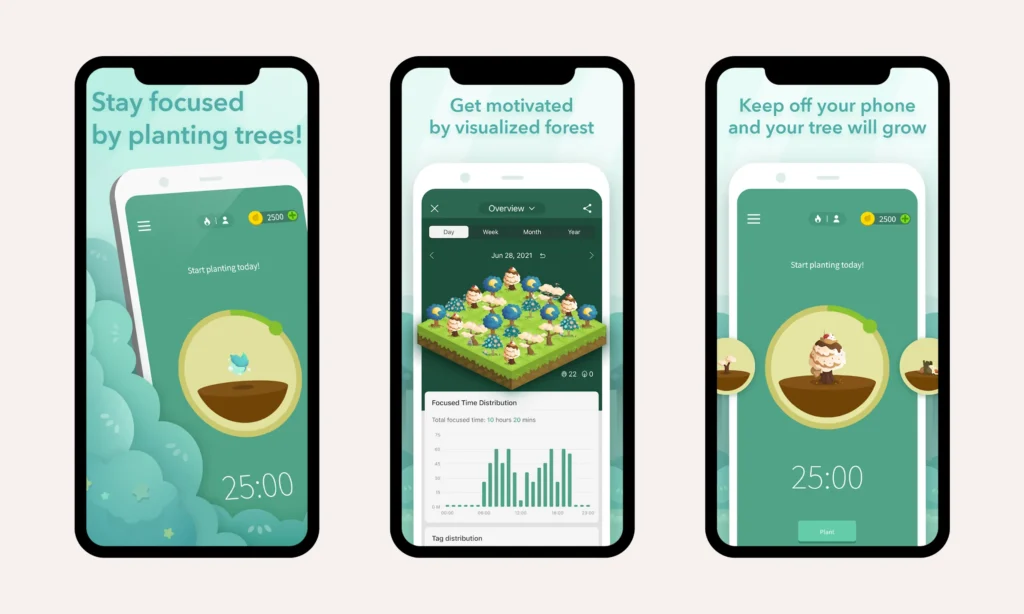
Forest
Forest is a unique productivity app that uses the concept of virtual trees to encourage focus. Every time you start a task or enter “focus mode,” a virtual tree begins to grow. If you stay focused, the tree will flourish; if you leave the app, the tree withers. The app’s visual feedback and environmental impact (some sessions result in planting real trees) make it great for people who prefer a simpler, focused approach to habit-building. Forest is a paid app ($3.99) however Flora, Plantie, and Focus Plant are free alternatives.
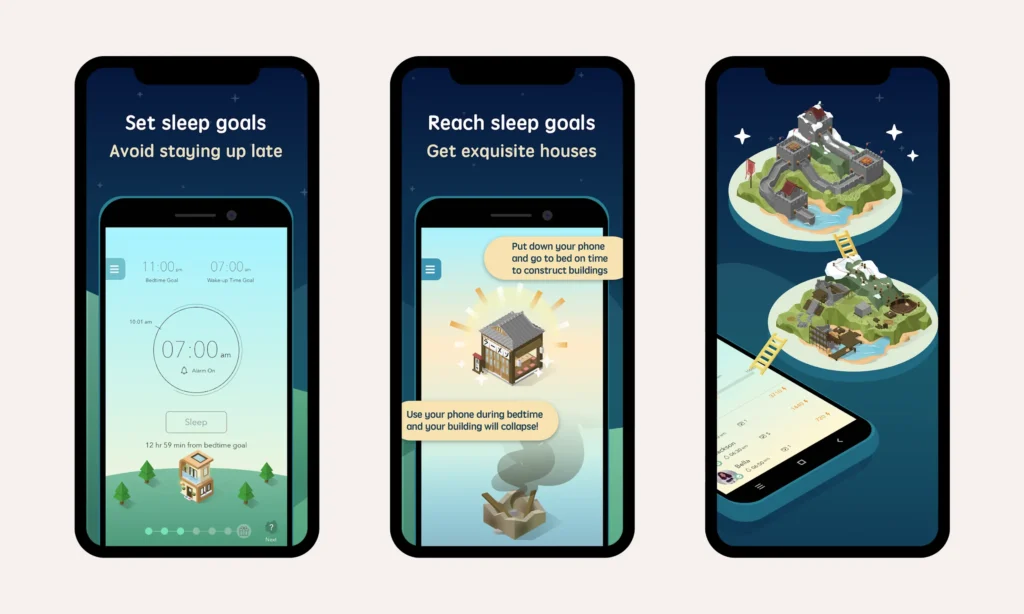
SleepTown
SleepTown encourages a healthy sleep schedule by gamifying bedtime and wake-up routines. When you go to bed on time, a building is constructed in your virtual town, which grows over time. If you miss bedtime, the construction stops, helping reinforce a consistent sleep habit. It is a paid app ($1.99).
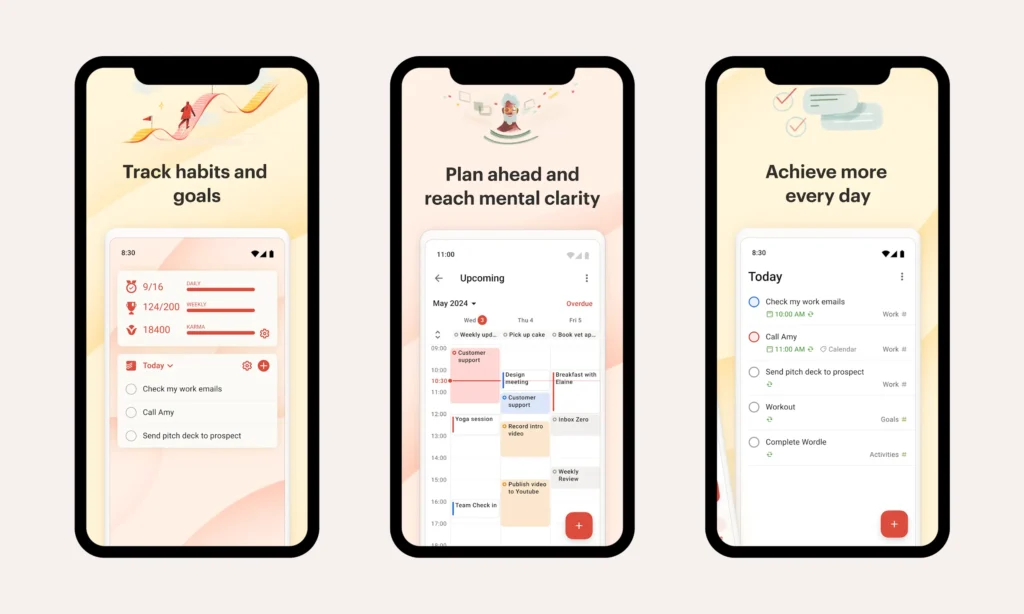
Todoist
Todoist combines productivity with gamification by awarding karma points for completed tasks and letting you track streaks. It’s ideal for those who want productivity with light gamified elements and personalized to-do lists.
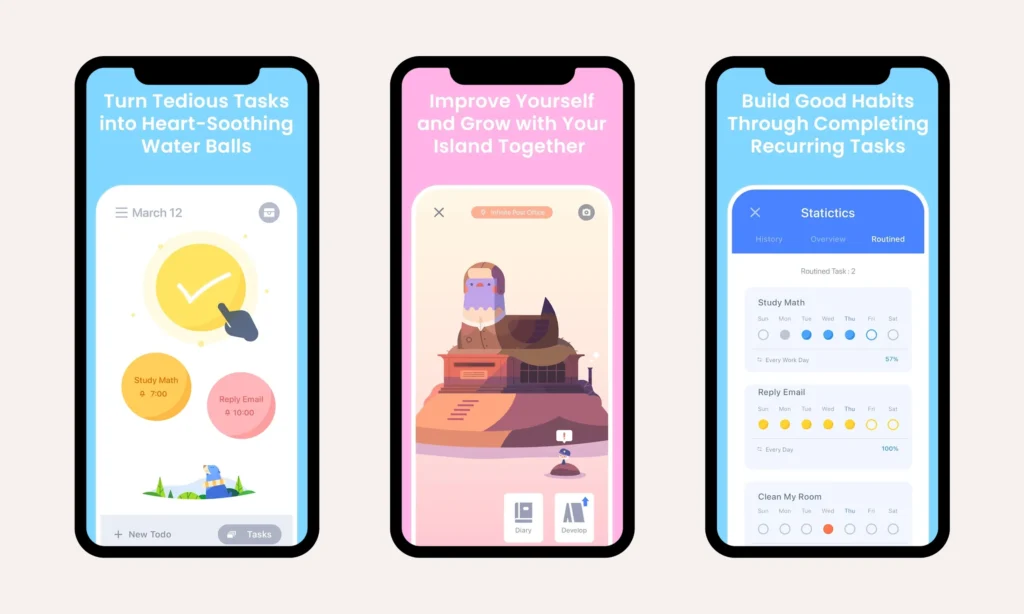
WaterDo
WaterDo combines task management with a fun, whimsical design. Tasks appear as bubbles, and completing a task “pops” the bubble, offering a visually satisfying sense of progress. As you complete more tasks, you level up, unlocking items for your own island where you can upgrade buildings and welcome new residents. It’s perfect for users who prefer a playful, visually engaging approach to habit tracking.

Plant Nanny
Plant Nanny is a hydration-tracking app that gamifies drinking water by letting users grow virtual plants every time they meet their hydration goals. With customizable plant options and visual growth, it’s ideal for anyone looking to maintain hydration in a fun, interactive way.
Zombies, run! 5k Training
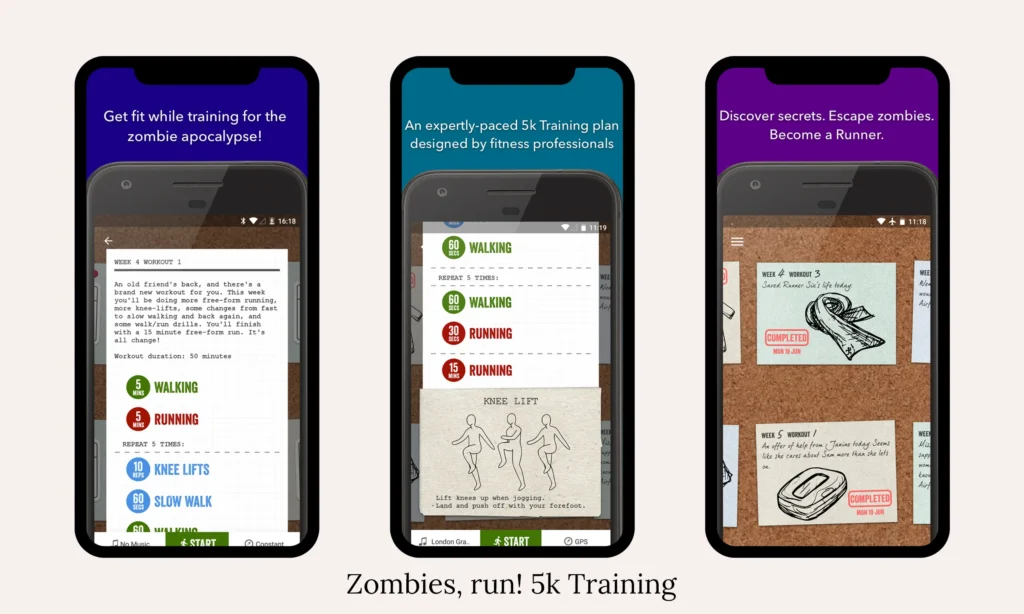
The Zombies, Run! 5K Training is an immersive fitness app designed to help beginners gradually train for a 5K run while enjoying an exciting zombie-themed narrative. Combining interval training with gripping storytelling, you’ll run, walk, and jog through a post-apocalyptic world, completing missions and collecting supplies to build your base, all while evading zombie hordes. It’s fitness and adventure in one!
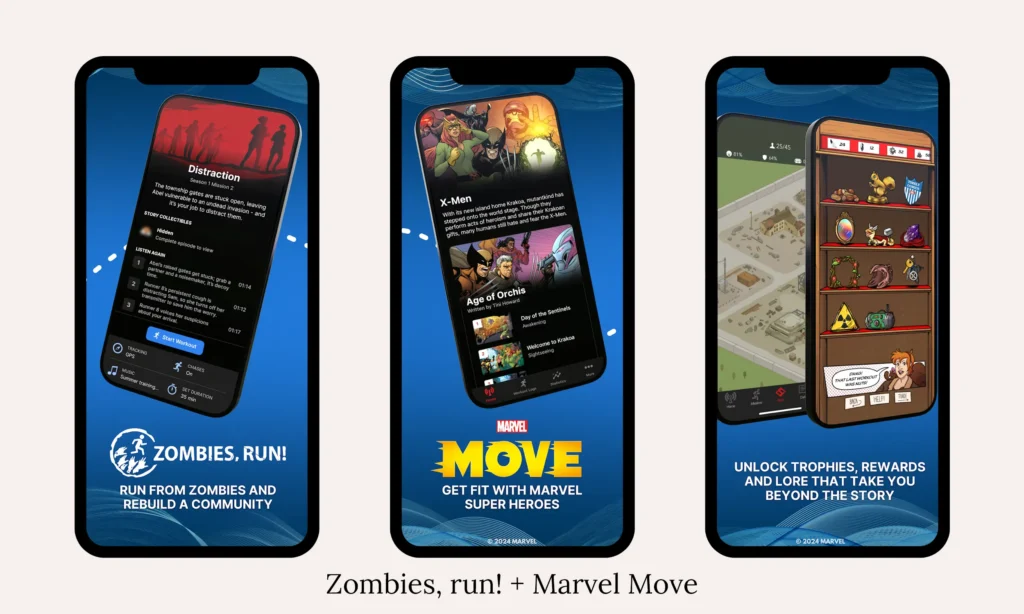
Zombies, run! + Marvel Move
Zombies, Run! + Marvel Move is a fitness adventure app that combines storytelling with exercise. Immerse yourself in thrilling zombie chases or epic Marvel missions featuring iconic superheroes like Thor and Loki. Walking, jogging, or running, every step propels you deeper into dynamic stories that make workouts fun and engaging.
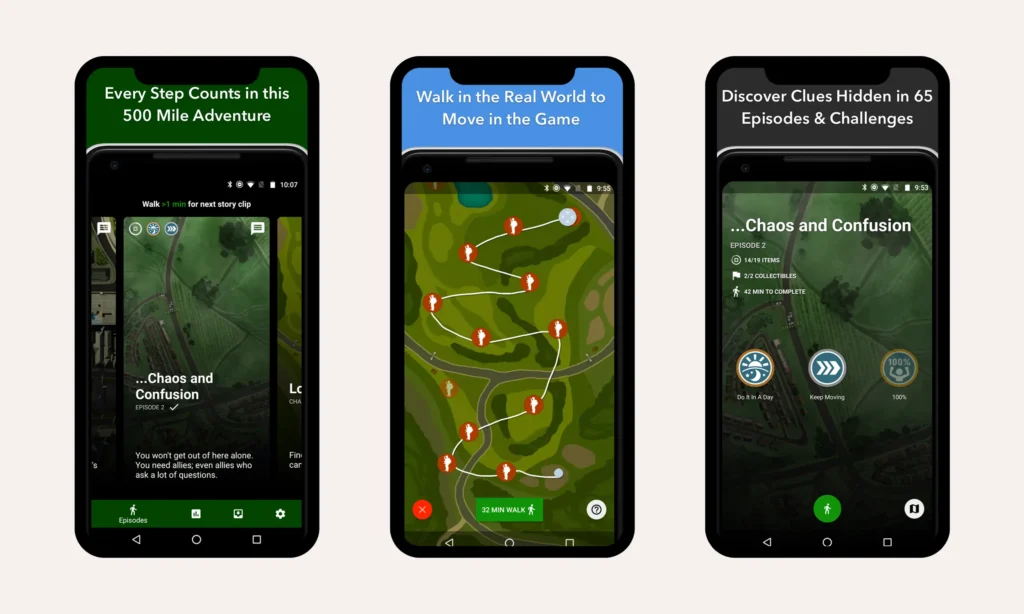
The Walk: Fitness Tracker Game
The Walk is a fitness app that encourages walking through a suspenseful, story-based adventure. As you walk, you unlock story segments and audio cues that reveal a mystery, keeping you motivated to move and uncover more of the narrative. It’s great for users who want a lower-intensity activity with a focus on exploration and curiosity.
Tips for Choosing the Best App for You
- For those who look for social support: Apps like Habitica or Forest social features encourage friendly competition and accountability.
- For those who need visual motivation: Apps like Plant Nanny or Sleep Town are perfect for users motivated by visual elements like bubbles, trees, towns, or plants.
- For those who seek productivity: TodoIst and WaterDo focus on productivity with light gamification elements to stay organized and build routines effectively.
Choose an app that aligns with your motivation style (intrinsic vs extrinsic), personality, lifestyle, community support, flexibility, and specific habits can create a more enjoyable experience for you!
Do you use any apps, tools, or systems that gamify your routines? Which ones have worked best for you?

For now I’ve only tested apps, and the ones which have worked best for me are definitely Habitica and Duolingo.
Thanks to Habitica I’m building habits and tackling difficult tasks I kept putting off before, and thanks to Duolingo I got back into learning German and I’m learning Latin too!
Forest is a very good choice for focusing and avoiding distraction, and I like Moodpress for tracking my mood and journaling.
Notifications and widgets are so important for my current system that I feel compelled to recommend them again.
If you don’t know where to start and you play videogames, think of the things you enjoy about the games you play. I tend to be more engaged in a gamified routine if I find things I usually like in videogames, like earning things when leveling up, playing with friends, character customization, or being able to build my character’s stats to my liking like in Elden Ring or Dungeons and Dragons.
Potential Pitfalls of Habit Gamification
I have talked marvels about this system however it’s not without its challenges. Here are some potential downsides to be mindful of, along with tips to overcome them!
- Burnout from Constant Tracking and Goal-Setting.
- Challenge: If you feel compelled to log every single action or maintain daily streaks without a single break, it can feel overwhelming and can cause someone to abandon the habit entirely.
- Tip: build in breaks by setting flexible goals like allowing yourself rest days or taking time off when needed.
- Perfectionism and “All-or-Nothing” Thinking
- Challenge: Gamification can sometimes fuel perfectionism, you may strive to earn all badges, keep streaks, or complete levels perfectly. Missing a day may feel like a failure, which can be counterproductive.
- Tip: Focus on consistency instead, set realistic expectations, and reward yourself for effort rather than flawless completion.
- Overemphasis on Rewards Instead of the Habit Itself
- Challenge: the external rewards such as points, badges, or leaderboards may become more enticing than the habit itself. When rewards become the sole motivator, you may lose focus of your intrinsic benefits, like health or growth.
- Tip: Take some time to reflect on why you started the habit in the first place. Extra points if you can write it down and have it on display in your room, workspace, or wherever this habit takes place, even if it’s just a post-it note. Shift your focus toward the positive impact it has on your life, rather than just the reward you earn.
- Potential for Increased Stress or Anxiety
- Challenge: Gamified habits may create unnecessary stress, especially if users feel pressured to compete with others or maintain their streaks. This pressure can lead to anxiety rather than enjoyment.
- Tip: Adjust your settings to turn off competitive features if needed and instead celebrate your own growth, remember your journey is unique.
- Habitual Dependency on the App
- Challenge: Some users may become overly reliant on the app to maintain their habits. While gamification can be a powerful tool initially, it’s essential to develop the habit independently of the app over time.
- Tip: Gradually reduce reliance on the app by building internal reminders or practicing the habit without logging it daily. This can help you develop a natural routine that doesn’t depend on external tracking.

I’ve been using Habitica for almost two months now and it still helps me a lot, but I’ve also antagonized it many times whenever I felt sad or anxious. Getting penalized doesn’t work for me so, whenever I was unable to tick off all my to-dos and the app ‘punished me’ for it, I felt TERRIBLE. However, I think I’ve reached a point in which I feel accomplished knowing I did what I could do considering the circumstances of my day. Even if the day was terrible, if I manage to do a total tick off, I feel like I did something right.
“If apps that hold you accountable make you anxious, you should try to find alternatives that work for you.” While I support that statement, I also think that pushing through it could have benefits. Something good might be waiting for you on the other side if you manage to overcome the initial stress.
in your opinion, How can gamification maintain long-term motivation without causing burnout?

As fun as a gamified habit system can be, I think it’s important not to lose sight of why you’re playing in the first place. If it becomes something that you’re doing just to get some points or a dopamine hit instead of keeping a habit, or the pressure of not breaking a streak is becoming a new source of stress, then I think your current system is not working for you anymore. Find what makes you feel engaged and not pressured. I’m someone who benefits from body doubling, so I know I can maintain long-term motivation more easily if I use gamified apps in tandem with friends. Another thing that works for me are events like seasonal items that you can achieve by doing something, daily quests or random games that help the app avoid monotony. These are some other ideas that don’t work for me personally, but streaks, achievement badges and fictional currency that you can spend on rewarding yourself with a snack or something fun in real life might be helpful for some people too.
The Takeaway
Gamifying habits can transform the journey toward self-improvement, making it more enjoyable and sustainable. By turning daily routines into engaging tasks, gamification taps into the brain’s natural reward system, helping us stay motivated and resilient, even when habits feel challenging. Whether you’re looking to boost productivity, build healthier routines, or find more enjoyment in everyday tasks, gamified tools offer a creative approach to personal growth!
As someone newer to gamification, what made you decide to try it out? For those who are on the fence about giving this method a shot, what was your mindset at the time, and what motivated you to implement it?

Sure! Well, I don’t have a diagnose but I have the feeling that I could have ADHD. I struggle to keep my daily activities (not just chores, just life in general) organized and I struggle to stick to one task instead of doing three in one go and half-assing them. Another problem is that I usually know what I have to do but I don’t want to do it because I don’t have the motivation and I get no satisfaction from it. My biggest gigant to fight are the dishes, I never want to wash the dishes and I try to slack off all the time but that doesn’t feel good either. That’s why I decided to give this app a go. It rewards you for doing whatever tasks you add to the list, and you can sort them by difficulty from easy to hard so it gives you cooler rewards when you do something that’s hard for you to get done. I still hate washing the dishes but now I’m kinda excited to do it because I will get a small prize. For example, I was able to hatch a ‘bear cub’ egg with an autumn potion and now I have a bear made out of leaves that I can take care of. Whenever I have to do something that’s boring or tedious I think ‘i need to feed my bear’ and I feel more motivated to do it. It might be childish but I needed something like this and it has made my daily routine feel more like an adventure. It’s good to have a source of excitement and joy, specially now with everything that’s happening around the world. I have things to look forward to every morning.
Oh! And there’s this ‘quest’ feature in which you can make a party with your friends and fight monsters and each monster is inspired by a bad habit. Right now we’re fighting a basi-list, the mechanics consists on it attacking those who haven’t ticked off all their daily tasks and to-dos, so I feel more compelled to be disciplined. I think this app is great for bonding haha
Ready to try it for yourself? Explore the apps and strategies shared here, and start building habits that stick. Which habit will you gamify first, or how are you already doing it? Share your thoughts in the comment section below! 🙂
If this article made things easier for you, I’d love it if you shared it with your friends and anyone who might need it!
Dont forget to follow me on social media for fun sneak peeks, behind the scenes and art! links on the sidebar.
Feeling Inspired? Here’s Some Extra Fun Stuff!
- Top 10 Ways to Maximize Your 10-Minute Work Breaks
- Easy Exercises to Combat Sitting All Day: Stay Active at Your Desk
- How to Beat Imposter Syndrome as a VTuber and Find Your True Voice ft. PiperSensei
Don’t Forget to Pin This for Later!
